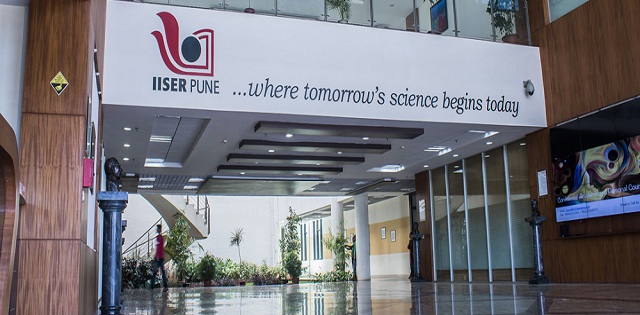IISER Pune Students Developing Sustainable Method For Biofuels By Harnessing Power Of Photosynthetic Bacteria And Synthetic Biology

Pune, 26 August 2021: Undergraduate students from the Indian Institute of Science Education and Research Pune are developing a sustainable method for producing biofuels by harnessing the power of photosynthetic bacteria and synthetic biology to reduce rising carbon emissions.
Carbon dioxide concentration levels in the atmosphere are higher now than at any other time in human history, and they are only projected to rise due to human activities. Carbon dioxide is a greenhouse gas, which plays a crucial role in regulating the surface temperature of the planet.
As it continues to accumulate, it leads to a net increase in average global surface temperatures. We are already experiencing the effects of climate change due to global warming – from more extreme rainfall, droughts, cyclones, and wildfires, to the extinction of numerous plant and animal species. If global warming continues unabated, it spells truly catastrophic effects on humanity and the natural world.
A team of undergraduate students from IISER Pune is developing a solution to tackle a major source of carbon emissions – the use of fossil fuels to generate industrial chemicals like fuels, plastics, pharmaceuticals, synthetic fabrics, etc. These chemicals are principally made of carbon, which is sourced from coal and crude oil as raw materials. Inevitably, some of this carbon is lost into the atmosphere as carbon dioxide gas. The net climate impact is that some carbon which was originally buried underground gets into the atmosphere as carbon dioxide, causing global warming.
The students aim to create a sustainable alternative method for chemical manufacturing that doesn’t depend on fossil fuels and doesn’t produce any new carbon emissions. Their two-step technique first traps some of the carbon dioxide from the atmosphere photosynthetically to generate renewable carbon reserves; and then produces chemicals from this reserve.
Each step is facilitated by a genetically engineered species of bacteria. The carbon dioxide is taken up by Synechococcus elongatus, which belongs to a group of photosynthetic bacteria called cyanobacteria. The stored carbon is recycled by the microbiologist’s favourite, Escherichia coli. To avoid any wasteful extra steps, the two will be grown in the same vessel.
The cyanobacteria will be genetically modified to continually fix carbon dioxide as sucrose (table sugar) and to secrete it out. E. coli will be engineered to be capable of consuming this sucrose and to convert it into chemicals like butanol, a biofuel.
The strain of cyanobacteria the team plans to use is extremely efficient at converting carbon dioxide into sucrose, even more so than plants such as sugarcane. Cyanobacteria have minimal maintenance requirements and use a fraction of the space and resources required to cultivate plants to obtain sucrose, making them an ideal candidate for sustainable manufacturing.
The team envisions their co-culture system as a sort of microbial cell factory that can sustainably produce industrial chemicals from light and carbon dioxide. Switching one strain of E. coli with another appropriately modified strain would allow one to switch which final product one wishes to manufacture.
The team is developing this idea in line with the United Nations’ Sustainable Development Goals – climate action, clean energy, and sustainable production – for the prestigious iGEM competition. iGEM, which stands for International Genetically Engineered Machine, is an annual competition, where student teams from across the world work to solve real-world problems using synthetic biology – an interdisciplinary field that seeks to create novel biological systems or redesign existing ones using engineering principles.
In addition to experimentally validating their project idea for its scientific soundness, the team also wishes to actively engage with the general public, stakeholders, and experts – specializing in biosafety, industry, and policy – to integrate feedback into their project design. They believe that public engagement with science is crucial, as it gives the citizenry ownership of science, and enables their participation in science policy and scientific discourse.
In this spirit, the students are also conducting a range of outreach activities to bring about awareness on synthetic biology and climate change – these include surveys, infographics, education videos, and more. They hope that this broader effort to foster public participation and collective action will complement their research project in forging a path toward a greener future.
Team Details:
Primary Investigator: Prof. Thomas Pucadyil
Team Members:
Ashwin Uday (1st Year iPhD)
Misaal Bedi (3rd Year BS-MS)
Sanjana Vasanth (2nd Year BS-MS)
Ashli Jain (2nd Year BS-MS)
Namasivayam Gomathi Sankar (2nd Year BS-MS)
Likhith Chandragiri (2nd Year BS-MS)
Vidisha Hate (2nd Year BS-MS)
Arsh Shaikh (2nd Year BS-MS)
Soorya Narayan (2nd Year BS-MS)
Akash Dutta (2nd Year BS-MS)
Arya Narnapatti (2nd Year BS-MS)
Jason Joby (2nd Year BS-MS)
PhD Advisors:
S Mukundan (2nd Year PhD)
Rushik Bhatti (1st Year PhD)
Devatrisha Purkayastha (2nd Year iPhD)
Mantri Mohit (2nd Year iPhD)
Prem Pritam (IIT Bombay) (6th Year PhD)
Veeral Jain (IIT Bombay) (4th Year PhD)
Undergraduate Advisor:
Chinmay Patwardhan (3rd Year BS-MS)






